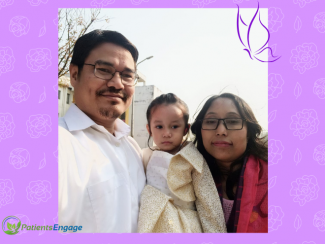
Waikhom Bimolata, 37, from Manipur, recounts her journey from being diagnosed with two autoimmune diseases Lupus and Sjogren's, her complex anxious-ridden pregnancy and successful motherhood. Here, she hopes to encourage other aspiring mothers in similar situation.
You are a young mother with autoimmune inflammatory disease Lupus. Could you tell us when were you diagnosed with it and what were your early symptoms?
I was diagnosed with Lupus nephritis in 2016. My early symptoms included fatigue for most of the time with severe to mild body and joint pains. Other symptoms included fever, swelling in some body parts, loss of appetite, excessive hair fall almost on the verge of becoming bald. My earlier medication was only Wysolone and HCQS with other supplements which didn’t help me much. My lupus symptoms worsened with frothy urine and Raynaud’s syndrome (discoloration of finger tips on touching cold water).
हिंदी में पढ़ें: मैं लुपस और शोग्रेन्स के बावजूद माँ बनी
Much before my lupus symptoms, I was diagnosed with another autoimmune disease Sjogren’s syndrome. This was in 2012. But the symptoms were not diagnosed for nearly five years before. I began by having excessive dry mouth, dry eyes, persistent and painful parotid glands (salivary glands) swelling (at this point one doctor told me I had mumps). My problems worsened with blurry vision. I also started getting consistent numbness, tingling and burning sensation in my leg and had developed a fibroid kind of thing on my neck. I had visited dozens of doctors, right from ENTs, ophthalmologist, oncologist and couple of neurosurgeons and neurologist, but nobody could detect what was happening to me. Finally, it was a neurologist who helped me with the diagnosis. He diagnosed it as Sjogren’s syndrome.

Women with lupus who get pregnant are considered to have high risk pregnancy. How did you start planning for your pregnancy? What preparations and precautions did you take before?
I was quite sceptical and reluctant to go further with pregnancy; yet, my rheumatologist Dr Geetabali Sircar from SSKM Hospital, Kolkata, encouraged me considerably. I started planning for pregnancy during remission period. I stopped taking the medicines Rituximab and MMF a year before pregnancy and shifted to another immunosuppressant while still continuing with low doses of Prednisolone. As a preparatory step, I was advised to take folic acid six months in advance. Regular visits to doctor with all the required medical tests done and constant monitoring our body condition is a must. I followed my rheumatologist’s instructions wherever necessary which really helped me be on track.;
Listen to Dr. Manish Dugar on Lupus and pregnancy. Click on image below
Lupus pregnancies are at an increased risk of premature birth and repeated miscarriages? Did you ever fear any of these?
That feeling of uncertainty and insecurity was there of course. Still, once the step had been taken, I couldn’t turn back. A positive outlook and leaving everything else in the hand of Almighty helped me overcame this. Just ignore the negative views.
Did you face any complications during pregnancy?
It was my first pregnancy and I was lucky to pass through it smoothly without much complications.
Lupus flares are common during pregnancy. Did you experience any? How did you differentiate between changes in your body due to pregnancy or warning signs of a lupus flare?
I didn’t face any lupus flare up during my pregnancy.
Were your rheumatologist and gynaecologist working as a team to manage your lupus?
Yes, partly they were working as a team as they were from the same hospital. My rheumatologist and her team of doctors played major role in managing my lupus during pregnancy. My gynaecologist also suggested that I should follow the same instructions given to me by the rheumatologist.
Did you modify your diet to keep your lupus in control?
I preferably ate simple home cooked food with plenty of seasonal vegetables. My diet also included most of the seasonal fruits and nuts. I avoided taking outside food, any processed and packaged foods, no dairy products, no sugar, less oily and less salty diet which I’m still continuing as much as possible.
Which trimester of your pregnancy has been most challenging and why?
In late 2nd trimester I had cold allergy. I was suffering for almost a month. Other than that my whole pregnancy was quite normal.

How old is your daughter? How is she doing?
My daughter, Khaidem Lingjelleima, is now 2 years and 7 months old. She is perfectly healthy, fit and fine.
Were you able to breastfeed your child? Did lupus interfere in anyway?
After delivery, I had stopped taking Azoran and took Rituximab shots so that I could breastfed my baby. I breastfed her for a year and had to stopped since started taking MMF to maintain lupus.
Could you tell us about your work at IIT Kharagpur?
Here, I’m working as a Post-Doctoral Fellow, engaged in research related to Plant Sciences. It involves lot of laboratory experiments which require physical labour.
How are you moving through life with lupus, young daughter and your work?
I had been through ups and downs in my journey so far. I had to leave my previous job as I was bed ridden for almost 6-8 months. Due to my initial symptoms of lupus nephritis, I used to have whole body ache, joint pains and swellings every alternate day due to which I was not able to move around. Then I shifted from Imphal to Kolkata. I was introduced to Dr Sircar by one of my relatives in Kolkata and my previous doctor too had recommended her name. She has been my life saviour who came as an angel in my life.
Lupus has now become a part of my life and I have learnt to live with it. I listened to my body needs like taking rest for a day when I feel exhausted. Managing a young daughter, work and family is indeed tiresome, however, I have a very supportive husband. At the work front too, my boss understands my situation and is quite supportive. I have flexible working time.
What advice would you give someone with lupus planning a pregnancy?
- Firstly and most importantly, stabilize your lupus.
- Ensure regular follow-ups with doctor.
- Know the state of your body.
- Proceed further with the advice from the rheumatologist.
- Find a good rheumatologist and gynecologist.
- Trust your doctors and follow their advice.
- A good relationship between doctor and patient is very important.
- Always have a positive mindset.
- In addition, do a little bit of meditation and yoga to relax body and mind.
- Last but not the least, follow a healthy diet and avoid food which triggers lupus.







